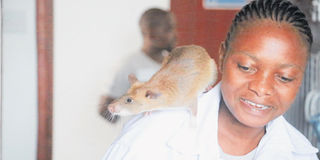When giant rats work ‘smarter’ than hospitals

Suzan Zablon,assistant teacher at Apopo Institute carries one of the herorats on her shoulder during the ceremony of new TB detection centre in Dar es Salaam. PHOTO|ANTHONY SIAME
What you need to know:
- Ms Bajuni, a resident of Dar es Salaam, narrates that her six year old grandchild went through a series of tests at Muhimbili National Hospital (MNH) but none of the tests revealed if the boy had TB.
Mwajuma Bajuni’s grandson was coughing and experiencing night sweats with persistent fever for several months. The family didn’t know he had tuberculosis (TB), despite undergoing medical tests at the country’s major referral hospital, Muhimbili.
Ms Bajuni, a resident of Dar es Salaam, narrates that her six year old grandchild went through a series of tests at Muhimbili National Hospital (MNH) but none of the tests revealed if the boy had TB.
It was until recently when well-trained giant rats, guided by researchers from Sokoine University of Agriculture (SUA) challenged the results of the lab tests from the hospital, and proved that Bajuni’s grandson actually had TB.
The giant rats trained to sniff out TB
They are regarded as heroes of TB detection—the Apopo Herorats, which exposed the weaknesses of the country’s diagnostic facilities in detecting the micro-organisms—Mycobateria Tuberculae.
Mr Fidelis Ghally, the co-ordinator of the giant rats training in the Apopo project says that trainers use a devise known as a Clicker to help the animals communicate what they may have detected.
“We have so far trained 40 rats. Some of them are working in Mozambique, India and Ethiopia. The have successfully ended the week for detecting landmines in Angola,” says Mr Ghally.
He says the rats have proved to be very creative, dynamic and flexible in knowledge acquisition for rapid innovations to solve various problems in societies.
When a rat detects any TB strain, he says, it hovers over the sample for at least three seconds, and the animal can carry out the same process on 100 samples in less than 15 minutes, whereas the same procedure could take as long as two days in conventional methods at health facilities.
He tells Your Health that it’s currently very expensive and unreliable to diagnose patients at local health facilities, and this has prompted some interventions by researchers to come up with innovative solutions.
Ms Bajuni believes that without the giant rats technology, her grandson would probably have died of TB. She says she ‘lost trust’ in conventional laboratory tests when experts at hospitals could not establish what her grandchild was actually suffering from.
“But when Apopo experts took the sample from my grandchild for testing, the rats revealed it was positive for TB,’’ says Ms Bajuni as she gives a testimony of how her child was diagnosed by using rats and then put on treatment.
“As you can see the boy now looks healthy,” says Ms Bajuni in an interview with Your Health, recalling the days when her grandson was weak and was coughing most of the time.
Your Health caught up with the lady during the launch of a modern facility for testing TB in the city through the use of the rats in Dar es Salaam.
Her grandchild, who happens to be a victim of weak diagnostic infrastructure for TB, is not alone. Experts say that there are millions of Tanzanians in urban and rural areas who are undiagnosed and unaware.
Saviours and not enemies
The Apopo Project Manager from SUA, Dr Georges Mgode says that training rats for detection of landmines and TB, which actively started in 2014 has already detected over 10,000 TB patients in Tanzania and out of them, 6,000 were identified as positive.
According to Dr Mgode the technology is cheap and useful, because it uses less time and money than the normal testing methods used in health facilities across the country. “Our recent research findings have indicated that at least 60 per cent of people in the country are living with TB without identification. This is costly and dangerous because once the disease becomes complicated, among millions of people, the cost of diagnosis, let alone treatment is very high,” says Dr Mgode.
According to him, a new laboratory for testing potential TB patients in Dar es Salaam has become a reality thanks to the support of around $400,000 from the UK Human Innovation Development Fund (HDIF).
And, in September this year, the HDIF provided $30 million for financing a programme to attract young innovators into such projects in the country, known as Mawazo Challenge.
“The Apopo rodents are cost effective in detecting TB. Their level of efficiency in terms of sensitivity is around 80 per cent and specificity 90 per cent depending on cut-off point; that is number of rats used in the calculation. They are normally useful in crowded areas such in the mines and big hospitals with many outpatients,” he says. According to a 2015 report from the Ministry of Health Community Development, Gender, Children and the Elderly, new cases of TB remained relatively higher last year at 781,936 people up from 83,227 detected in 2014.
This implies that the government last year spent about $156 million (Sh341 billion) for detecting 781,936 people who were infected with TB.
A research scientist from SUA, Ms Mariam Juma , said in June this year that SUA-APOPO Rodent have capacity to sniff out and diagnose the disease, while proving “effective and faster than conventional diagnostic methods’’ in Tanzania and Mozambique.
In a study conducted in 2015 by BCM Health Service, it was revealed that delayed diagnosis of TB patients is contributed by patients and other risk factors. The delays were due to misconception about TB/HIV and poor knowledge of TB symptom, findings show.
Heroes on a bigger mission
The newly launched HeroRat TB Detection innovation is now expected to develop to go a step further in detecting other diseases, such as cancer.
In his recent speech at the launching of the facility, the Director of Health Quality Assurance in the Ministry of Health, Community Development Gender and Children and Elderly, Dr Mohamed Ally Mohamed said that the government was now working to transform the facility so that it can reach at a stage of detecting cancer, ebola and other diseases.
“The government will support researchers to team up for transforming this important facility for detection of other deadly diseases that have been affecting many Tanzanians. We are told that the HeroRats developed by SUA can be trained to detect cancer,” said Dr Mohamed.
According to him, the Apopo project based at SUA, is an important study centre that can be successfully used to use rats and reduce the cost of testing patients for zoonotic infections—meaning those that transmitted from animals to human beings.
The Chief Executive Officer of Tanzania Veterinary Laboratory Agency (TVLA), Ms Furahisha Mramba says his agency is hosting such a modern centre with high expectations of being able to detect the zoonotic infections.
Ms Mramba says that the agency is ready to team up with other research institutions such as National Institute for Medical Research (Nimri), SUA and Muhimbili University of Health Sciences to improve such technology.
The head of TVLA adds that the co-operation between researchers dealing with animal diseases and those in diseases affecting human beings is important due to increasing trend of zoonosis in Tanzania.
Apopo project has also achieved an international status and has been receiving support from the Belgium government; Swiss based NGOs and the United States Agency for International Development. Due to such progressive and remarkable achievements, the Apopo project has turned to be the centre of excellence in Africa, making SUA as one of the best universities in Africa for animal science studies, according to 2016 government report.
For many years people view rats as their enemies because they are known to destroy their food and property, but now researchers under Apopo project at SUA have turned them into saviours of people’s lives.
It remains to be seen how more and more Tanzanians will benefit from the Apopo centre, especially in increasing the capacity of diagnosing and other diseases afflicting people in the country.




